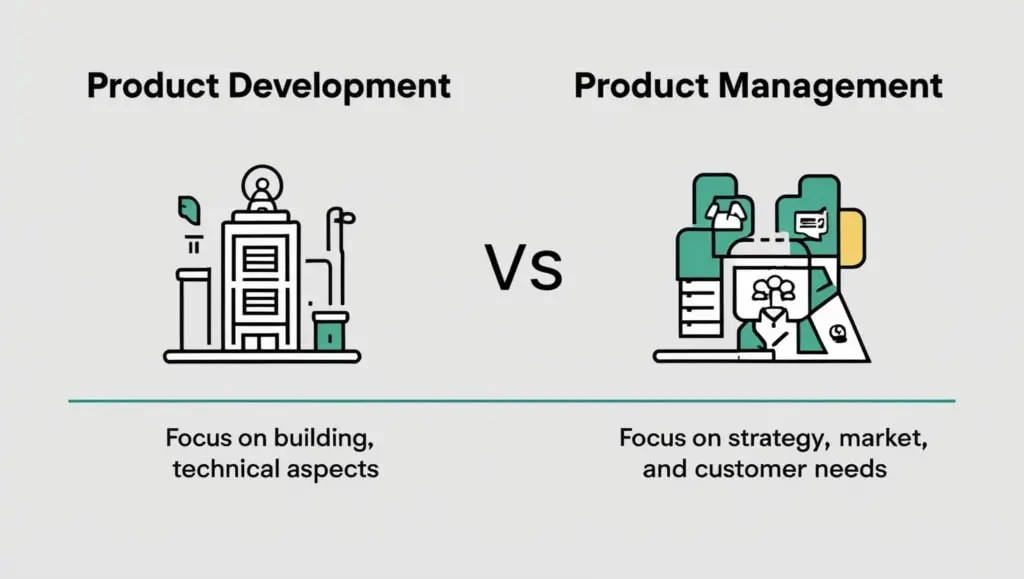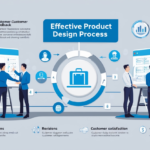- November 14, 2024
- by uyuwh
- Blog
- 0 Comments
Understanding what is the difference between product development and product management is crucial for anyone involved in creating and delivering products. Although these two functions often work hand-in-hand, they serve distinct purposes and require different skill sets.
In this article, we will explore the key differences between product development and product management, including their respective roles, responsibilities, and how they collaborate. By the end, you’ll have a clearer idea of the unique characteristics that define each role.
Table of Contents
Product Development
Product development refers to the end-to-end process of taking a product from concept to market. This process involves several stages such as ideation, design, prototyping, testing, and refinement. The main focus of product development is to ensure that a product is technically feasible and meets the functional requirements set by stakeholders.
Key responsibilities in product development include:
- Research and Analysis: Understanding market needs, technological feasibility, and customer preferences.
- Design: Developing product specifications and features that align with market demands.
- Prototyping: Creating initial versions or models of the product to test and iterate upon.
- Testing and Quality Assurance: Ensuring the product meets both functional and usability standards.
- Launch: Finalizing the product for mass production or distribution.
Product Management
Product management, on the other hand, is a broader role that focuses on the strategy and success of a product throughout its entire lifecycle. While product ai development is primarily concerned with building the product, product management involves deciding what to build, why it should be built, and when it should be launched. Product managers serve as the bridge between different departments such as engineering, marketing, and sales, ensuring that the product meets business objectives and user needs.
Key responsibilities in product management include:
- Market Research: Analyzing market trends, customer feedback, and competitor products.
- Strategic Planning: Defining product goals, timelines, and success metrics.
- Roadmap Management: Creating a timeline for product features and releases.
- Stakeholder Communication: Collaborating with cross-functional teams to ensure the product aligns with company goals.
- Lifecycle Management: Overseeing the product from ideation through launch and post-launch performance.
Understanding the Key Differences
To truly grasp what is the difference between product development and product management, it’s important to focus on their distinct roles and responsibilities.
- Focus:
- Product development is centered on building the product itself—bringing an idea to life.
- Product management is more strategic, focusing on market positioning, business goals, and customer satisfaction.
- Scope:
- Product development focuses on the technical and operational aspects of creating the product.
- Product management has a wider scope, involving market research, customer needs, and the overall product vision.
- Ownership:
- Product developers own the technical execution, making sure the product functions as intended.
- Product managers own the product’s success in the market, ensuring it solves the right problems and fits the company’s broader strategy.

Responsibilities and Processes
When it comes to understanding what is the difference between product development and product management, it’s important to note that these roles follow distinct yet interrelated processes.
Product Development Process:
- Idea Generation: Generating ideas based on market research, customer needs, or technological advances.
- Design and Prototyping: Developing product specifications and creating prototypes.
- Testing: Testing the product to identify bugs, usability issues, or design flaws.
- Production and Launch: Once the product passes testing, it is moved to production and eventually launched to the market.
Product Management Process:
- Market Research: Gathering data on customer pain points and market opportunities.
- Strategic Planning: Defining the product’s purpose, key features, and go-to-market strategy.
- Roadmapping: Creating a detailed plan for product development, outlining timelines and feature prioritization.
- Post-Launch Evaluation: Monitoring the product’s performance after launch and adjusting strategies as needed.
Roles and Skills
Understanding what is the difference between product development and product management also involves comparing the roles and skill sets required for each function.
What to Study to Become a Product Manager? – Learn With Yathu Karunailingam
Skills for Product Development:
- Technical Expertise: A deep understanding of the technology and tools used to create the product.
- Problem-Solving: The ability to troubleshoot issues that arise during the development process.
- Attention to Detail: Ensuring that the product meets design and quality standards.
Skills for Product Management:
- Strategic Thinking: The ability to define long-term goals and align them with business objectives.
- Communication: Collaborating effectively with different departments to align everyone on the product vision.
- Market Insight: Understanding customer needs, market trends, and competitive positioning.
Collaboration and Interplay
Even though product development and product management have distinct roles, their collaboration is key to the success of any product. Product managers and developers need to communicate frequently to ensure that the product being built aligns with market needs and business goals.
- Product managers outline the strategy, objectives, and market needs.
- Product developers execute that vision by designing, testing, and building the product.
Together, these roles ensure the product is both technically sound and aligned with customer expectations.
Making the Choice: Which Role is Right for You?
If you’re trying to decide between a career in product development and product management, it ultimately comes down to your interests and skill set.
- If you enjoy working on the technical side of things, problem-solving, and building tangible products, a career in product development might be right for you.
- If you prefer strategy, communication, and working closely with various stakeholders to define the direction of a product, product management could be a better fit.
Product Owner Vs Product Manager – Learn With Yathu Karunailingam
Conclusion
In conclusion, understanding what is the difference between product development and product management is essential for businesses aiming to create successful products. Product development focuses on the technical aspects of designing, creating, and refining the product itself, while product management oversees the product’s strategy, ensuring that it aligns with customer needs and business goals.
The two functions are deeply intertwined. Without strong product development, it’s impossible to build a viable product. At the same time, without thoughtful product management, a product may fail to meet market demands or deliver the desired business value. For organizations, finding the right balance and ensuring effective collaboration between these roles is critical to long-term success.
If you’re considering a career in either product development or product management, it’s important to assess your strengths. Those with a passion for technical innovation and hands-on creation may thrive in product development, whereas those with a focus on strategy, user experience, and market fit may find product management more appealing.
FAQs
What is the primary focus of product development?
Product development primarily focuses on the design, engineering, and creation of a product. It covers all technical aspects from ideation to the final build.
What is the role of product management in product lifecycle?
Product management oversees the product from a strategic perspective, ensuring it aligns with market needs, business goals, and customer demands throughout its lifecycle.
Can someone work in both product development and product management?
Yes, it’s possible to transition between roles, especially in smaller organizations. However, each role requires a specific set of skills, and excelling in both may be challenging without significant experience.
What skills are essential for a product manager?
Product managers need strong communication, analytical, and strategic thinking skills. They must also have a good understanding of the market, user needs, and business objectives.
How do product managers collaborate with product developers?
Product managers and product developers work closely throughout the product lifecycle. The product manager defines the vision and requirements, while the product developer ensures the technical feasibility and execution.





